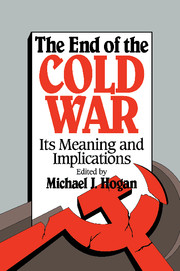Book contents
- Frontmatter
- Contents
- Preface
- The Authors
- Dedication
- 1 Introduction
- 2 An End to Which Cold War?
- 3 The Cold War, the Long Peace, and the Future
- 4 Quiet Cataclysm: Some Afterthoughts on World War III
- 5 Some Lessons from the Cold War
- 6 Nuclear Weapons and European Security during the Cold War
- 7 Victory in the Postwar Era: Despite the Cold War or Because of It?
- 8 The Wicked Witch of the West is Dead. Long Live the Wicked Witch of the East
- 9 The End and the Begining
- 10 A Balance Sheet: Lippmann, Kennan, and the Cold War
- 11 Why Did the Cold War Arise, and Why Did It End?
- 12 A View from Below
- 13 The End of the Cold War and the Middle East
- 14 The End of the Cold War in the Near East: What It Means for Historians and Policy Planners
- 15 After the Cold War: The United States, Germany, and European Security
- 16 The End of the Cold War: A Skeptical View
- 17 The End of the Cold War, the New Role for Europe, and the Decline of the United States
- 18 The Fading of the Cold War—and the Demystification of Twentieth-Century Issues
- 19 The U.S. Government, a Legacy of the Cold War
- 20 Foreign Policy, Partisan Politics, and the End of the Cold War
- 21 Beyond Bipolarity in Space and Time
- 22 A Usable Past for the Future
- Selective Bibliography
- Index
7 - Victory in the Postwar Era: Despite the Cold War or Because of It?
Published online by Cambridge University Press: 18 December 2009
- Frontmatter
- Contents
- Preface
- The Authors
- Dedication
- 1 Introduction
- 2 An End to Which Cold War?
- 3 The Cold War, the Long Peace, and the Future
- 4 Quiet Cataclysm: Some Afterthoughts on World War III
- 5 Some Lessons from the Cold War
- 6 Nuclear Weapons and European Security during the Cold War
- 7 Victory in the Postwar Era: Despite the Cold War or Because of It?
- 8 The Wicked Witch of the West is Dead. Long Live the Wicked Witch of the East
- 9 The End and the Begining
- 10 A Balance Sheet: Lippmann, Kennan, and the Cold War
- 11 Why Did the Cold War Arise, and Why Did It End?
- 12 A View from Below
- 13 The End of the Cold War and the Middle East
- 14 The End of the Cold War in the Near East: What It Means for Historians and Policy Planners
- 15 After the Cold War: The United States, Germany, and European Security
- 16 The End of the Cold War: A Skeptical View
- 17 The End of the Cold War, the New Role for Europe, and the Decline of the United States
- 18 The Fading of the Cold War—and the Demystification of Twentieth-Century Issues
- 19 The U.S. Government, a Legacy of the Cold War
- 20 Foreign Policy, Partisan Politics, and the End of the Cold War
- 21 Beyond Bipolarity in Space and Time
- 22 A Usable Past for the Future
- Selective Bibliography
- Index
Summary
It is natural to analyze war in terms of victory and defeat, and so it is almost inevitable that the end of the Cold War will be analyzed in these terms. But is the concept of victory and defeat an appropriate analytical framework for understanding the outcome of the Cold War? What state can possibly claim victory in the Cold War—certainly not the former Soviet Union? But can the United States be considered the victor either?
It seems unlikely that either superpower “won” the Cold War when one compares their relative positions in the world prior to the Cold War with their positions afterward. In 1945 the United States had a monopoly on atomic weapons and was virtually invulnerable to attack. By the end of the Cold War both superpowers had massive atomic arsenals and shared equal insecurity under the regime of Mutual Assured Destruction, a situation that left the Soviet Union no better off than before and that clearly marked a decline in American power.
That the Cold War resulted in the relative decline of both superpowers is also clearly discernible when one examines their economic situations. The military competition of the Cold War left the Soviet Union as economically devastated as it was after World War II. The United States came through the Cold War with its economy much more intact, just as was the case after 1945.
- Type
- Chapter
- Information
- The End of the Cold WarIts Meaning and Implications, pp. 77 - 86Publisher: Cambridge University PressPrint publication year: 1992

